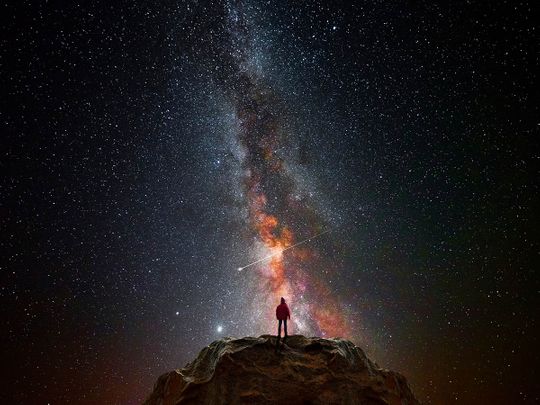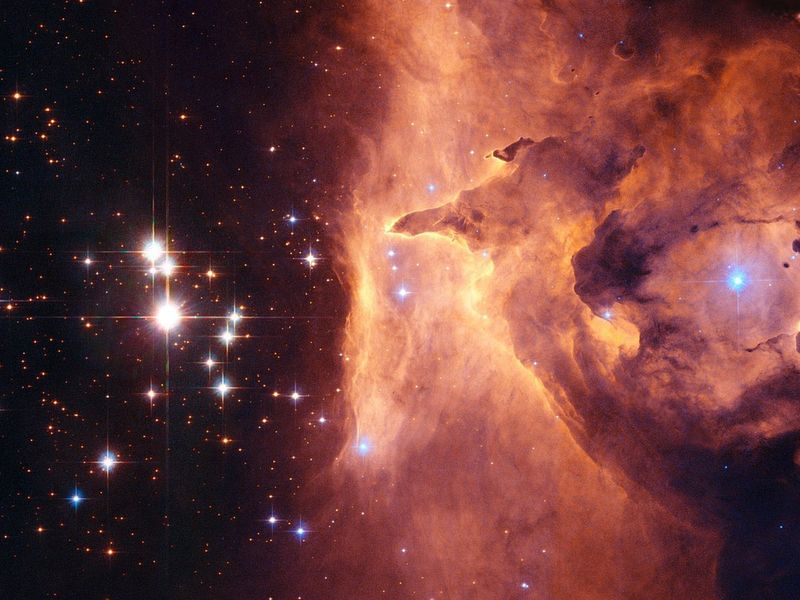
“The most exacting phrase we hear in astronomy, the phrase that heralds new discoveries”, Isaac Asimov, professor of chemistry at Boston University and on the side one of the “Big Three” science fiction writers in America (along with Robert A. Heinlein and Arthur C. Clark), once quipped, “is not ‘Eureka’ but ‘that’s funny’ “
The phenomena that abound in our cosmos, from elementary particles to black holes, appear to behave in such anachronistic a manner that they seem, well, kinda funny.
It’s surely funny that the lifespan of an elementary particle is one billionth of a second, that is, a nanosecond, and that black holes, those supermassive monsters found at the centre of galaxies, including ours, the Milky Way, each carries the equivalent mass of millions and at times billions of suns.
Funny indeed — though funny as in scratch-one’s head funny.
Well, unbeknownst to us ordinary folks going about our quotidian lives, a multinational team of astrophysicists had for the last 15 years or so been listening, as it were, to the music of the spheres and, in a historic first, heard a chorus of gravitational waves rippling through the universe, which affirmed Einstein’s theory of relativity, namely that space is not empty and that time does not move forward like, as it were, Old Man River.

Bobbing in all directions
In a globally coordinated move last month, this team of scientists announced their discovery to the world simultaneously. The news, a milestone in gravitational astronomy (a field still relatively in its infancy) sent thrills through that part of the scientific community devoted to the study of astrophysics.
What had been discovered was mind-bending: Everything in the universe — effectively the very fabric of the universe itself — is constantly roiled by gravitational waves that ripple through space and time, or more accurately space-time.
The picture that emerges is that we live in a universe that looks and behaves like a choppy sea, where everything on it is not just bobbing up and down but bobbing in all directions, churned by violent events that had taken place roughly 15 billion years ago, a “time” (apostrophes needed here since there was then neither “time” nor “space”) when the Big Bang exploded out of nowhere into nowhere.
Hiding bewildering mysteries
So, you say, it is true that the discovery may, as is being claimed, open new windows on everything from the evolution of galaxies to the origin of the universe, but what’s the point?
Isn’t asking questions about that issue like asking how many angels can dance on the head of a pin, the Medievalist practice of wasting time looking into a topic of no practical value and asking questions whose answers hold no social merit?
True, when we look at our human being in the vastness of the universe, we feel, at first blush, humbled. This is a universe with an estimated 100 billion galaxies, each home to an unimaginable number of stars with each in turn located in a neighbourhood that is home to a family of planets orbiting around it, a universe hiding a countless number of bewildering mysteries about the nature of its being.

We are a miracle
In that vastness, Earth is but a speck, so much of a Johnny-come-lately on the scene that there are stars out there so far away that light from them, which marks their birth date, requires 15 billion years to reach it.
Yet, we are a miracle — and, I say, a divinely inspired miracle at that. And what is miraculous about us, what is miraculous in us, is that not only do we have a consciousness of time and the ability to speak a language — which elevates us respectively above the eternal present and the meaningless grunt of the beast — but we are intellectually inquisitive beings who ask questions for the sake of asking questions, who engage art for the sake of art, who pursue knowledge without the expectation that anything practical may accrue from it and who, to assuage our existential angst, seek to understand more in order to fear less our sense of seeming aloneness in this vastness.
Heck, there are entomologists who devote their lifetime to studying an obscure species of ant in the Rainforest of the Amazon; naturalists who, in like manner, devote theirs to studying how the seeds of a sakoa become seedlings, then saplings and finally towering trees; and philologists who also stoically toil their entire lives trying to figure out how metaphor was used by speakers of an extinct language like, say, Akkadian, once spoken in ancient Mesopotamia but remained forgotten till it was rediscovered after its cuneiform script was deciphered in the 19th century.
Confirming Einstein’s Theory of Relativity
So it is with the discovery by physicists two weeks ago that cosmic ripples are flowing through the universe, which turn it into a choppy sea where everything in it, including our planet, is constantly bobbing, both up and down and in all directions — finally confirming Einstein’s 108-year-old theory of General Relativity.
Yet, and here’s the rub, there have been times when scientific discovery was put in the service of evil (think here atom bombs, cluster munitions, poison gas and other weapons of mass destruction), that is, in the service of the brutal logic of warfare,
We are intellectually inquisitive beings who ask questions for the sake of asking questions, who engage art for the sake of art, who pursue knowledge without the expectation that anything practical may accrue from it and who, to assuage our existential angst, seek to understand more in order to fear less our sense of seeming aloneness in this vastness
This was the question that, as a case in point, confronted German American theoretical physicist J. Robert Oppenheimer, director of the Los Alamos Laboratory during the Second World War, who was known as the father of the atom bomb for his role in the Manhattan Project, the research undertaking that came up with that deadly weapon of mass destruction, a man who in later years went on to symbolise the folly of scientists who believe that that they could “control” the use of their research and “deal” with the dilemmas of moral responsibility in the nuclear age.
And it is this very question that celebrated film director Christopher Nolan’s biographical thriller “Oppenheimer”, already hailed as a masterpiece of cerebral cinematic art, will be addressing as it is released.
Meanwhile, we continue to seek knowledge, to pursue scientific discovery, because it is, very simply in our nature to do so, because we were created by our Maker, He the All-Knowing, “to seek knowledge though it may be located as far away as China” and because only in knowledge can our human being strike root.
— Fawaz Turki is a noted academic, journalist and author based in the US. He is the author of The Disinherited: Journal of a Palestinian Exile.








